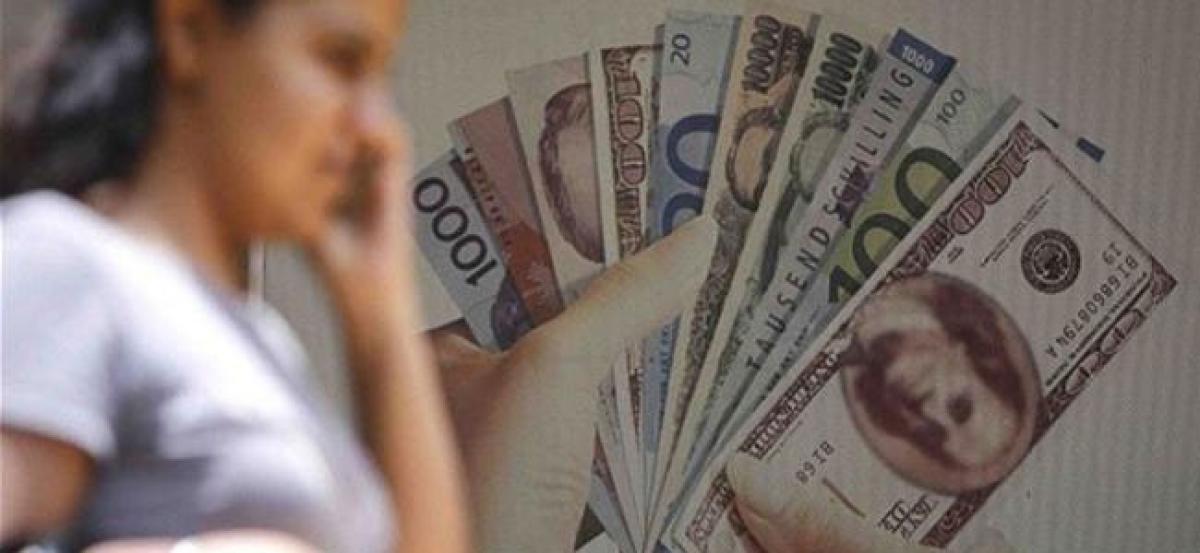Live
- BGT 2024-25: Kohli is passionate about the way that he plays, says Ponting
- Defence Minister Rajnath Singh to meet Chinese counterpart in Laos today
- Medical staff told to be humble, attentive while treating patients
- Police arrests Chinese nat'l for cyber fraud
- Garena Free Fire Redeem Codes for November 20th: Get Free Rewards Now
- Are strict laws needed to ensure MLAs attend Assembly sessions?
- Gold rates in Vijayawada today surges, check the rates on 20 November, 2024
- Anti-pollution measures push daily wager into a livelihood crisis
- Srinagar records season's first sub-zero temperature
- Scrapping ‘tourism’ quota by TTD sparks debate
Just In

Most emerging Asian currencies edged up on Monday, with the Korean won leading gains as the dollar was subdued by questions over the strength of the U.S. economy after weak economic data.
Most emerging Asian currencies edged up on Monday, with the Korean won leading gains as the dollar was subdued by questions over the strength of the U.S. economy after weak economic data.
The dollar's rally on the back of rising interest rates was tempered by a fall in U.S. housing starts in May to the lowest in eight months and after a barometer of U.S. consumer sentiment unexpectedly fell in early June.
"Whether forex markets are clueless on the way forward or dollar bulls are getting cold-feet with post-FOMC knee-jerk rallies fading, is debatable," Mizuho Bank said in a note.
Political risks in the United States involving Trump, the FBI and Russia have stymied hawkish cues from the Federal Reserve to some extent with softer economic data also hampering the dollar bulls for now, Mizuho added.
The won led the gains among emerging Asian currencies, climbing as much as 0.5 percent, after posting sharp losses on Friday.
South Korea's central bank was suspected of selling dollars to slow the won's fall towards the close of onshore trade, multiple traders said on Friday.
In other currencies, the Taiwanese dollar appreciated 0.2 percent against the dollar.
Taiwan's export orders in May likely rose for the 10th month in a row helped by strong global demand for the island's components for the upcoming Apple iPhone 8 and other tech gadgets, according to the median estimate of 10 analysts polled by Reuters.
Bucking the trend, the yen drifted lower after strengthening marginally on Friday.
Japan's imports rose more than expected in May, partly due to increasing demand for intermediate goods companies need to manufacture their products.
CHINA'S YUAN
The Chinese yuan drifted marginally higher to 6.812 on Monday, remaining on track to end a two-day losing streak against the dollar.
Net foreign exchange sales by China's commercial banks rose to their highest level in four months, official data showed, although capital outflows were kept under control by a string of tight regulatory steps.
China has tightened controls on money leaving the country to support the yuan and stem a slide in its foreign exchange reserves.
Yuan also saw some support from data showing prices in China's sizzling property market kept pace in May with the previous month, indicating resilient demand despite the imposition of tougher official measures to curb rising prices.
THAI BAHT
The baht nudged higher on Monday, continuing its strong performance against the dollar this year which has made it Southeast Asia's best performing currency.
Recent gains in the baht, now hovering near two-year highs, has had only limited impact on exports, a Bank of Thailand official said on Friday.
The baht is still moving in line with Thailand's economic fundamentals and regional currencies, assistant governor Vachira Arromdee, who leads the central bank's financial markets operations group, told Reuters in an interview.
The central bank does not target specific levels of the baht, but is ready to act on any excessive moves in the currency, she added.
Thailand is treading carefully after adopting draconian capital controls in 2006 that tarnished its reputation and triggered a 15 percent stock market plunge, but were later scrapped.

© 2024 Hyderabad Media House Limited/The Hans India. All rights reserved. Powered by hocalwire.com







